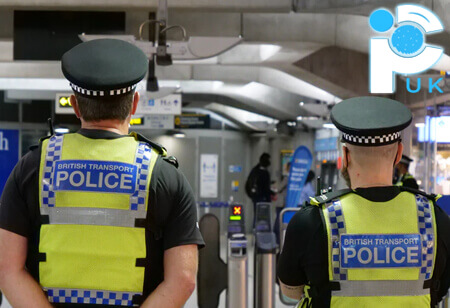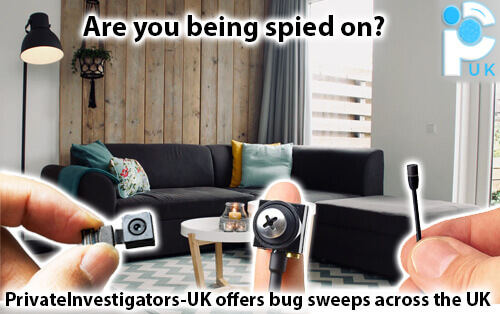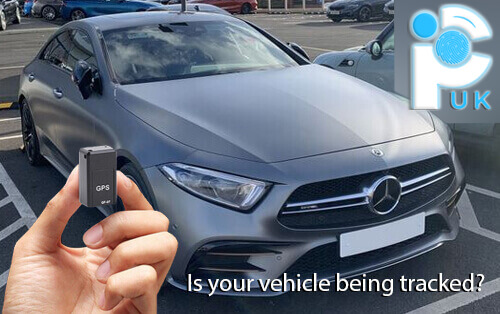How to Find UK Police Bugs in Your Home
May 16, 2021 - Reading time: 13 minutes
Updated on: September 28, 2025
Modern surveillance techniques have advanced dramatically, and while lawful surveillance by UK authorities exists, unauthorised tracking and spying by private entities is an increasing concern for many. Whether you are a high-profile individual, a business owner, or simply a privacy-conscious person, knowing how to detect hidden bugs can offer peace of mind.
Quick Navigation
- Understanding surveillance devices
- How to detect hidden bugs
- What devices look like
- Vehicles and GPS tracking
- Can the police bug your home after a raid?
- Can police bug your house without a warrant UK?
- How do I know if police have bugged my house?
- Preventing future surveillance
- Book a professional bug sweep
- Related articles
- FAQ
- Important legal note
Understanding Surveillance Devices
Surveillance bugs can come in many forms - hidden microphones, miniature cameras, or GPS trackers. These devices are sometimes used by private individuals or entities without consent. They can be placed in homes, offices, or vehicles. Some transmit data wirelessly in real time, while others store recordings for later retrieval. In rare but serious cases, advanced devices may be encountered - particularly when high-value targets or sensitive environments are involved. Detecting such equipment usually requires specialist knowledge and tools.
How to Detect Hidden Bugs
Detecting sophisticated surveillance devices requires proper equipment and experience. Examples include:
- RF receivers and spectrum analysers for wireless transmissions
- Camera lens detectors to find pinhole optics
- Non-linear junction detectors and near-field probes
- Thermal imaging and targeted physical inspections
While inexpensive bug detectors are widely available online, they may not be sufficient to detect advanced or well-concealed devices. Professional-grade tools and trained technicians can often locate hidden threats that consumer devices cannot.
Concerned your space is monitored? We can help 🔎
Bug Sweep (TSCM) Service - UK-wide, discreet, professional
- Detection and removal of hidden microphones, cameras, GPS trackers and covert Wi-Fi devices.
- Advanced RF spectrum analysis, lens detection and meticulous physical inspection.
- Free & confidential quotes: submit your postcode and property size via our secure form.
What Do Hidden Surveillance Devices Look Like?
Hidden bugs may resemble ordinary electronics or be disguised within everyday items. They could appear as:
- Small plastic boxes or circuit boards
- Altered smoke detectors or plugs
- Objects with unusual wiring or unexpected weight
Professional surveillance equipment may be extremely discreet. Identifying these often requires disassembly of electronics or inspection by someone trained in electronics and counter-surveillance.
Vehicles and GPS Tracking
Tracking devices in vehicles are increasingly common in private investigations, disputes, or even domestic abuse scenarios. They can be placed externally or internally in seconds and may operate for weeks or months depending on the battery. Microphones hidden in vehicles can also record conversations. A thorough sweep checks all likely concealment points.
Can the police bug your home after a raid?
In the UK, covert surveillance and property interference are tightly regulated by the Regulation of Investigatory Powers Act 2000 (RIPA). In serious cases, police may obtain lawful authority for intrusive surveillance, which could include installing listening devices. However, this requires high-level approval and is generally reserved for major organised crime or terrorism investigations. Police cannot casually bug a property after a raid without proper authorisation.
Can police bug your house without a warrant UK?
No. Intrusive surveillance in private residences requires a warrant or equivalent legal authority. Installing a covert listening device without it would be unlawful. If you are concerned about possible lawful surveillance, the safest step is to obtain independent legal advice.
How do I know if police have bugged my house?
There are no guaranteed outward signs. Suspicious details can include tampered fittings, unexplained new devices, interference on radios or TVs, or sensitive information leaking. Professional bug sweeps can identify common threats. If you specifically suspect lawful surveillance by police, do not tamper with devices-seek legal advice immediately.
Preventing Future Surveillance
- Use CCTV and motion sensors around access points
- Secure vehicles in locked or monitored areas
- Limit unsupervised access to private spaces
- Verify visitors and contractors
For high-risk situations, regular sweeps may be advisable. Our team offers nationwide bug sweep services tailored to homes, vehicles, and offices.
Book a Professional Bug Sweep
Private Investigators UK conducts TSCM bug sweeps nationwide. We use near-field receivers, spectrum analysis, lens detection, and physical inspection to locate hidden microphones, cameras, and trackers in homes, offices, and vehicles.
Unsure but concerned? Request a free, no-obligation quote with postcode and property size, or learn more about our process.
FAQ
Do UK police need a warrant to bug your home?
Yes. Intrusive surveillance in private residences generally requires a warrant or equivalent approval under RIPA 2000.
Can police bug your home after a raid?
Only if authorised under strict legal frameworks for serious crime or terrorism investigations. It cannot be done casually.
How common is police bugging in the UK?
It is rare and reserved for high-level investigations. Most concerns about bugs involve unlawful private surveillance, not police.
What law governs covert listening devices in the UK?
The Regulation of Investigatory Powers Act 2000 (RIPA) sets out the rules for lawful interception and intrusive surveillance.
Are Private Investigators Licensed in the UK?
May 15, 2021 - Reading time: 8 minutes
Updated on: August 27, 2025
Contents
- Are private investigators licensed in the UK?
- Do private investigators in the UK need an SIA licence?
- Should private investigators be licensed?
- The benefits (and limits) of licensing
- Professional bodies and memberships
- How the USA does it differently
- UK laws and what PIs can and can’t do
- About PrivateInvestigators-UK
Are private investigators licensed in the UK?
When most people think of a private investigator, they might picture someone in a trench coat with a shiny badge. In reality, private investigators in the UK don’t carry badges and there’s no official detective licence issued by the government.
Are private investigators licensed in the UK? The simple answer is no. Despite proposals over the years, there is currently no licensing system in place. Anyone, trained or untrained, can set up as a private investigator and start offering services.
PIs in the UK have no special legal powers – they must follow the same laws as everyone else.
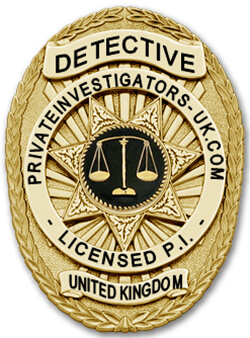
Photo: No – private investigators in the UK are not issued with badges!
Do private investigators in the UK need an SIA licence?
No – private investigators in the UK do not currently need a licence from the Security Industry Authority (SIA). The SIA regulates roles like door supervisors, CCTV operators, and close protection officers, but private investigation is not on their list.
Back in 2013, the government announced plans to introduce an SIA-backed licensing scheme for private investigators, but it was never implemented. Since then, nothing has changed.
This means there is no legal requirement for a PI in the UK to hold an SIA licence, although some agencies may employ investigators who already hold one because of their background in security.
Should private investigators be licensed?
Whether PIs should be licensed is still up for debate. Some argue licensing would help weed out rogues, require background checks, and ensure a basic level of training. Others say it would just add more red tape and push up the cost of hiring a PI.
In 2001 and again in 2013, proposals were drawn up, but nothing ever made it into law. At present, there are no government-backed plans for introducing PI licensing in the UK.
The benefits (and limits) of licensing
In countries where PIs are licensed, such as the USA, investigators sometimes get limited access to government databases, or exemptions from certain laws (like tinted windows). In the UK, even if licensing were introduced, GDPR and strict data protection laws would almost certainly prevent any access to sensitive databases.
At best, a licensing system here would provide accountability and perhaps some protection against being accused of harassment or stalking during surveillance. But many PIs argue that competent detectives shouldn’t need that protection because their work should remain discreet and unnoticed in the first place.
Professional bodies and memberships
Because there’s no government licence, some UK private investigators join professional associations. These bodies often set their own standards, codes of conduct, and may require background checks. Examples include the Association of British Investigators (ABI).
Membership can help reassure clients that an investigator is reputable, but it isn’t the same as holding a government-issued licence. Agencies with multiple memberships may also charge higher fees, since associations come with registration costs and annual dues.
How the USA does it differently
Most US states require private investigators to hold a licence, and the requirements vary by state. Investigators often need formal qualifications, a background check, and sometimes law enforcement experience. Because of this, hiring a PI in the States is generally more expensive than in the UK.
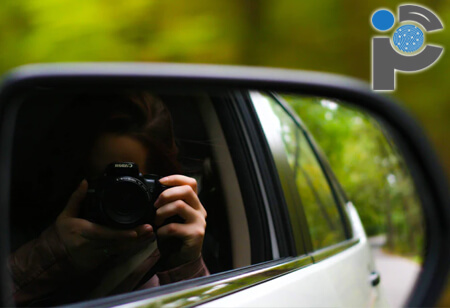
Photo: In the USA, licensed PIs may have access to tools and exemptions not available to UK investigators.
UK laws and what PIs can and can’t do
Since UK private investigators aren’t licensed, they must follow the same laws as everyone else. That means they cannot:
- Access phone records or bank accounts without consent
- Hack into computers, emails, or social media accounts
- Pretend to be police officers or government officials
What they can do is gather information legally through surveillance, background checks, open-source intelligence, and interviews – so long as they don’t break laws around data protection, trespassing, or harassment.
About PrivateInvestigators-UK
We are a leading detective agency based in the UK, covering all of Great Britain, Northern Ireland, and many other countries worldwide. Please feel free to read our homepage for more information about us and the services we offer, or get in touch for a free quote.
Related blog posts
Why Men Cheat on Their Pregnant Wives
May 13, 2021 - Reading time: 13 minutes
Updated on: October 5, 2025
It may sound unfathomable, but it’s not uncommon for men to cheat on their pregnant wives. Some experts estimate that 10% of men start having affairs when their wives are expecting.
What is it about pregnancy that can turn a faithful man into a cheating husband? Why do men stray at a time when they should be closer than ever to their partners?

1. Their Emotional Needs Aren’t Being Met
Infidelity isn't always about sex. Some men cheat because their emotional needs aren’t being met. Pregnant women, rightfully, receive a lot of attention and care. Men may feel left out of the picture and neglected.
A desire to feel cared for, wanted and needed can drive some men into the arms of other women when their wives are pregnant.
Cheating gives them that temporary validation and positive attention they’re seeking and not getting from their relationship.
Emotional needs can mean a lot of different things:
- Admiration: Everyone, including men, has an innate desire to be admired. But admiration is often one of the first things to go in a relationship. Partners stop complimenting and praising each other. When admiration is replaced with criticism, this can drive men to seek admiration from another woman.
- Affection: Pregnancy and marriage can put things, like affection, on the backburner. But a lack of affection can degrade a relationship. When men feel like they are unappreciated or unwanted, they may seek these things in another woman.
- Attractiveness: Unfortunately, some men struggle with the physical changes that women go through during pregnancy.
- Companionship: When couples first start dating, they plan dates and activities they both enjoy. These things can be neglected after marriage, and it can drive some men to seek out companionship in other women.
- Sex: If a man isn’t getting the sexual fulfilment he desires, he may seek it in another partner outside of the relationship. When a couple’s sex drive is out of sync, it can increase the risk of infidelity.
2. Pregnant Women Can Have a Lower Sex Drive
Pregnancy is a time of great change for women, and that includes their sex drive. In the first trimester alone, studies have shown that women have sex 20% less often because of their declining sex drive.
Several factors can affect a pregnant woman’s libido, including:
- Nausea or morning sickness
- Fatigue
- Fear of harming the baby
- Discomfort
- Feeling insecure
Lack of sexual intimacy drives many men to stray outside their marriage. A cheating boyfriend or husband may simply be looking to fill a physical need or desire.
3. Some Men Look for Outside Support

Whether it’s a couple’s first or third pregnancy, a child means change. Some partners don’t adapt well to change together.
A cheating husband may be feeling a whirlwind of emotions, including anger, stress, anxiety and fear. He may feel the need to look for support from someone outside of his relationship. Some men try to escape these feelings or their new responsibilities by seeking affection from other women rather than communicating with their partners.
4. Stress Can Drive Escapism in Men
Bringing a child into this world can be stressful. Research shows that for fathers-to-be, anxiety can be up to five times higher than normal during their partner’s pregnancy.
Life is changing. The future is uncertain. Couples may be arguing more than usual. Conflict and stress can cause some men to run away rather than resolve these issues with their partner.
The added stress of conflict and the pregnancy itself can drive some men to cheat because they’re looking for a way to escape reality. Cheating is just a form of escapism for some men. It’s their coping mechanism. That doesn’t make it right or healthy. But because they haven’t learned better ways to cope with their stress, they’ll try and escape reality by jumping into the arms of another woman.
5. Some Men are Ready to Call it Quits
Marriage and pregnancy complicate relationships. If a relationship was already on the rocks prior to pregnancy, some men may be ready to call it quits, but don’t know how to do it face-to-face.
Instead, they use cheating as a way to end the marriage. They hope their wives find out about their extramarital affairs and end the marriage for them.
6. Fatherhood Can Lead to an Identity Crisis
Fatherhood can trigger an identity crisis in some men, even if they already have children. Having children changes everything. Suddenly, life isn’t all about you.
Many parents lose their sense of self or identity. They feel disconnected with parts of themselves. Some men use cheating as a way to try and reconnect with those missing pieces or to fill a void.
7. Some Men are Bored

Boredom can drive men to cheat regardless of whether their wives are pregnant. Some men just aren’t ready to settle down and the idea of fatherhood may drive them to boredom. Others are just bored in general with the relationship (or their lives).
A desire for variety is a major driver of infidelity. Some men use cheating as a way to spice up their lives and kick boredom to the curb.
8. Childhood Trauma can Increase the Odds of Cheating
Men who have a history of childhood trauma – physical, emotional, sexual, etc. – may be more likely to cheat if they haven’t taken steps to address that trauma.
Unresolved issues and exposure to infidelity during childhood can also make some men more likely to cheat on their pregnant wives. Research shows that children who are exposed to parents having an affair were twice as likely to cheat themselves with future partners.
Men who have a history of cheating are also more likely to cheat in the future, and pregnancy may be just the right trigger to drive his impulses.
There are many reasons why men cheat on their pregnant wives – or why men cheat in general. Sex is sometimes the primary reason, but often, it boils down to unhealthy coping mechanisms, unfulfilled emotional needs or an ego that needs a boost.
How we can help
If you believe that your boyfriend or husband might be cheating on you whilst you are pregnant, then trust your instincts and don’t suffer in silence. We can help to investigate your partner, check his activities, and gather evidence in the form of photos/video.
Often women will not feel comfortable confronting their partners about infidelity until they have solid proof, which is what we endeavour to provide as part of our surveillance service. Of course, if your partner is not cheating, then we can help to confirm this and provide evidence, without your boyfriend or husband finding out that he is being monitored by us. Our agents cover all areas of the UK. Feel free to read our homepage for more information about us, or get in touch with one of our experienced team members for help and advice.
Related articles
- 10 surprising red flags that your partner is cheating on you
- How much does it cost to catch a cheating partner?
Worried Your Partner Is Cheating While You’re Pregnant?
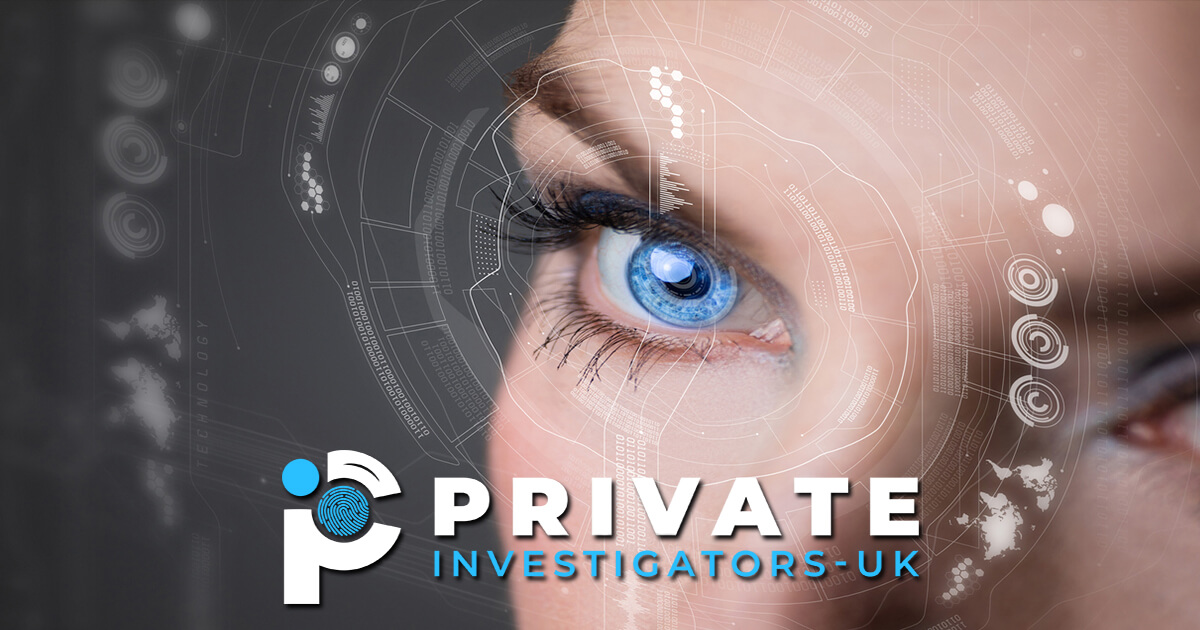
If you suspect your partner could be cheating on you, PrivateInvestigators-UK can help. Our network of experienced detectives operates across the UK, discreetly checking activities and gathering evidence. We offer free quotes for all work, and all enquiries are strictly private and confidential.
How to Catch Fly Tippers in the UK
May 7, 2021 - Reading time: 7 minutes
Updated on: April 30, 2024
Fly tipping is one of the unfortunate problems that private land owners in the UK are faced with. With substantial clean up bills amounting to thousands of pounds in many cases, the financial impact of fly tipping can often prove devastating.
Fly tippers often leave behind hazardous waste which can be costly to remove and potentially harmful to your health. Construction waste containing asbestos is regularly found within fly tipped rubbish and has the potential to contaminate your land, leading to even larger clean up bills.
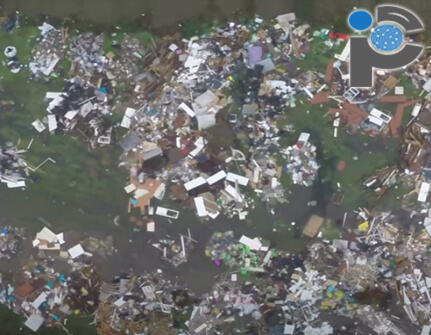
Due to the costs associated with clean up, many landowners take steps to fortify and protect their land, with the goal of blocking access to nefarious individuals and their waste. As a leading detective agency based in the UK, we have dealt with many cases where land owners have simply had enough of fly tipping, and instructed us to stakeout their land with the goal of catching fly tippers in the act.
How to catch fly tippers in the UK
We believe that the illegal dumping of waste has no place in a modern society, and that fly tippers should be caught and prosecuted wherever possible. With that in mind, we have put together the following tips which can be used to help catch fly tippers.
1. Keep an eye on your property
If you own a piece of vacant land, then making regular visits to it should be a priority for you. If fly tippers deposit waste onto a piece of land and discover that it has remained undisturbed for several weeks or months, this can act as encouragement for them to continue and deposit even more rubbish on the site.
Keeping an eye on your property can help to nip fly tipping in the bud before it escalates. Similarly, maintaining your land by regularly cutting back vegetation and hedges can sometimes help to make it appear well maintained and thus less appealing to fly tippers. Fly tippers will typically look to deposit waste onto land where it may not be noticed for several weeks or months, which helps to lower their likelihood of getting caught.
Joining your local “neighbourhood watch” or “farm watch” initiatives can also prove beneficial in many cases.
2. Install hidden cameras
If you are seeking to actually catch a fly tipper, then hidden cameras are a great means of doing so. Whereas overt cameras are often intended to act as a deterrent, hidden cameras can be used to gather evidence of fly tippers without them noticing or becoming aware of the surveillance.
Overt camera which are not hidden can sometimes even prompt fly tippers to take steps to conceal their identities, such as obscuring the number plates on their vehicles whilst they unload rubbish. If your goal is to actually catch a fly tipper in the act and prosecute them, then using hidden cameras would be a good choice in most cases.
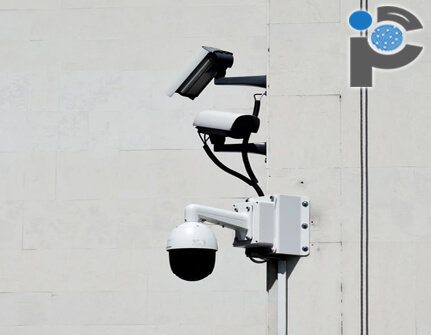
Camera technology has come a long way in recent years, and devices which are powered by solar panels, or rechargeable battery powered cameras can be utilized without a supply of mains power.
When choosing a camera, it’s important to select a model which is capable of recording vehicle number plates, and quality images of the perpetrator’s faces. The cameras should then be positioned in such a way that they remain discreet while capturing the best possible evidence.
If you are not technically minded or need help with installing a hidden camera on your land then we can help. We have installed camera equipment which has been used to catch those responsible for fly tipping on numerous occasions, and our detectives cover all areas of the UK. Please feel free to get in touch with us for a quote.
3. Conduct stakeouts on your property
While this may seem over the top to some, if your land has previously been subject to fly tipping then you will know that the clean up costs can quickly add up into thousands of pounds. Catching fly tippers red handed can provide the opportunity to pursue them through the courts with the goal of recovering any clean up costs they have caused you to accrue, as well as making the police aware so that they can hopefully begin proceedings in the criminal courts.
While conducting stakeouts, you should be mindful as to the position where you lay in wait, and make sure that you bring quality camera equipment which can be used to capture clear evidence. For stakeouts at night, cameras which capture high quality images during low light should be used.
If you are not able to stakeout land yourself or require help, then our detectives can help to provide you with surveillance, with the goal of catching any fly tippers in the act.
4. Work as a community
Fly tipping creates an unsightly blight on our country sides and urban areas, and with clean up bills across the UK reaching millions of pounds per annum, fly tippers cause land owners huge amounts of avoidable work and expense.
Rather than deterring fly tippers from entering your land and encouraging them to dump rubbish elsewhere, we feel that one solution is to work together as a community to catch fly tippers, prosecute them, and put them out of business for good.
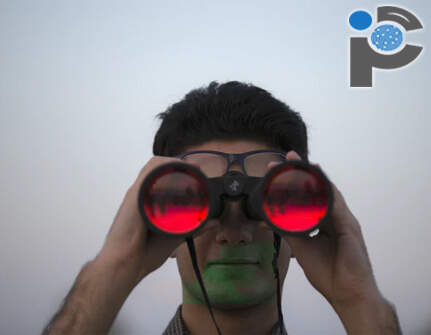
Working as a community to defeat fly tippers can take many different forms, from pooling resources to instruct private investigators to surveil an area with the goal of catching fly tippers in the act, setting up CCTV systems and sharing images with each other, or starting a neighbourhood watch program where community members keep an eye on each other’s properties.
Maintaining good relationships within your community is key. We suggest speaking to your neighbours and letting them know that you are not expecting deliveries of household or building waste on your property now or at any point in the future. Advise your community members of fly tipping activity in the area and ask them to jot down the number plates of any vehicles that are seen acting suspiciously.
Getting professional help
At PrivateInvestigators-UK, we are often instructed to help catch fly tippers, whether through our personal surveillance service, hidden camera installation, or other forms of investigation. If you would like to learn more about us and the different services that we offer then please read our homepage for more information, or feel free to contact one of our experienced team members if you require our help.
You are reading the PrivateInvestigators-UK blog — home to the UK's leading detective agency. Learn more about us by visiting our homepage PrivateInvestigators-UK.com.
